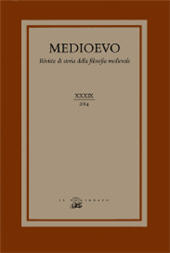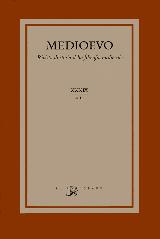Forme, contesti e interpretazioni : la filosofia di Gilberto di Poitiers (+ 1154)
89-134 p.
35 years after B. Maioli's still useful monography in Italian on Gilbert of Poitiers, according to Gilson the best metaphysician of the 12th century, this article wishes to summarize his philosophy including the results of the most recent studies. Chapters 3 to 6 describe Gilbert's ontology: the Boethian axiom "being (esse) is different from the thing which is (id quod est)" as signifying the difference between form (subsistentia) and determined thing (subsistens); the simplicity of the first principles - God, primary matter, ideas - and the composition as proper to each created being; natural things as the result of an ordered accumulation (concretio) of substantial and accidental forms, in which the more general forms precede and cause the more particular ones; singularity (i.e. numerical unity) of everything, both forms and subsistents, and individuality of just the subsistents and their total forms. Chapters 7 to 9 are dedicated to Gilbert's philosophy of language and epistemology.
According to Gilbert, while in the sentences that belong to the philosophy of nature the relation between predicates and subjects reflects the real inherence of forms in subsistents, mathematical and theological sentences express relations between concepts or forms and not real inherence. Philosophy of nature provides mathematics and theology with words and formal structures (transsumptio), while only theology reaches the authentic meaning of such words as 'being', 'good', and 'one': they are used in a derivative sense (denominatio) when said of created things. [Publisher's text].
35 anni dopo l'ancora utile monografia in italiano di B. Maioli su Gilberto di Poitiers, secondo Gilson il più grande metafisico del XII secolo, questo articolo vuole offrire una sintesi sulla sua filosofia che tenga presenti le più recenti ricerche. Le sezioni 3-6 illustrano l'ontologia gilbertina: l'assioma boeziano "Diverso è l'essere (esse) e il ciò che è (id quod est)" come riferentesi alla differenza tra forma (subsistentia) ed ente determinato (subsistens); la semplicità dei primi principi - Dio, la materia le idee - e la composizione (compositio) propria di ogni ente creato; gli enti naturali risultato di un'accumulazione ordinata (concretio) di forme sostanziali e accidentali nella quale le forme più generali precedono e causano quelle più particolari; singolarità (ossia unità numerica) di ogni cosa, forma o sussistente che sia, e individualità solo dei sussistenti e delle loro forme complete. Le sezioni 7-9 sono dedicate alla filosofia del linguaggio e all'epistemologia gilbertine.
Secondo il filosofo, mentre nelle proposizioni che appartengono alla filosofia della natura il rapporto tra predicato e soggetto riflette l'inerenza reale delle forme nei sussistenti, le proposizioni matematiche e teologiche esprimono relazioni tra concetti o forme e non inerenze reali. La filosofia della natura presta alla matematica e alla teologia lessico e strutture formali (transsumptio), mentre solo la teologia raggiunge il significato autentico di parole come 'essere', 'buono' e 'uno': queste sono usate in un senso derivato (denominatio) quando sono dette delle creature. [Testo dell'editore].
-
Articles from the same issue (available individually)
-
Information



